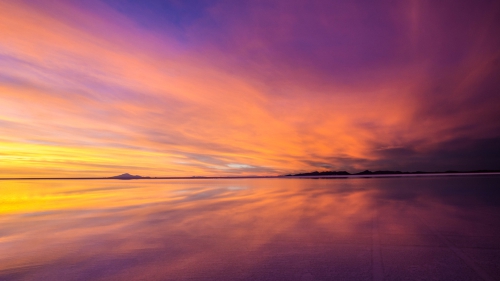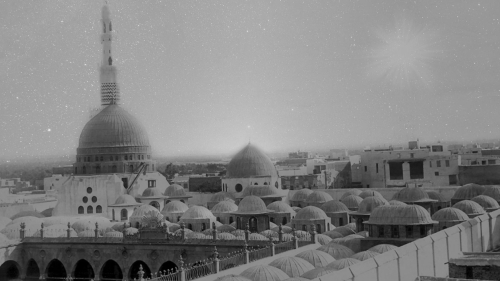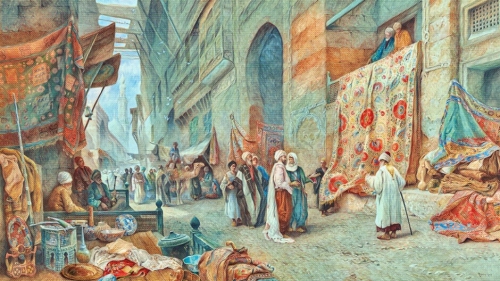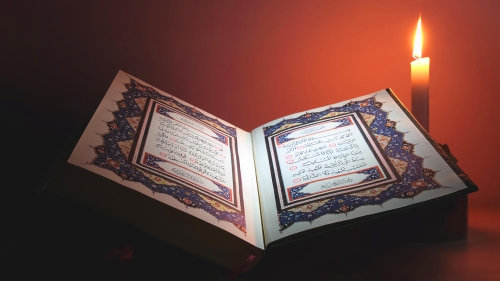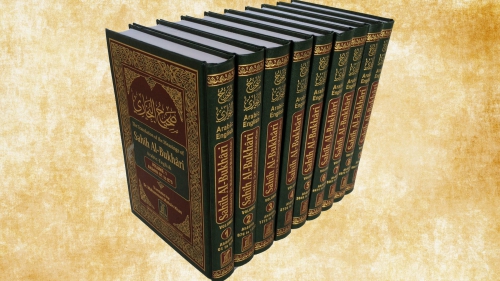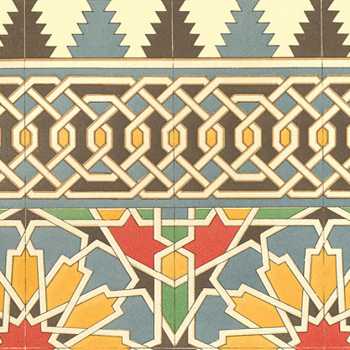The reward of deeds depends upon the intentions and every person will get the reward according to what he has intended.
Sahih al-Bukhari (Book 1, Hadith 1)
Hadith (also spelled "hadit" or "hadeeth") refers to the sayings and actions of the Prophet Muhammad (SAW), as well as reports about his teachings, actions, and personal characteristics. Hadith is a central source of Islamic theology and law and is considered to be second only to the Quran in importance.
Hadith are recorded in collections called "mussannaf," which are compiled by Islamic scholars and transmitters of hadith. These collections include information about the chain of transmission (isnad) for each hadith, as well as the content of the hadith itself.
Hadith literature covers a wide range of topics, including religious obligations and practices, legal issues, moral conduct, and the conduct of the Prophet Muhammad (SAW). Hadith are also used to supplement and explain verses in the Quran, and to provide examples of the Prophet's teachings and actions, which serve as a model for Muslims to follow.
The authenticity and reliability of hadith is of crucial importance, and Islamic scholars have developed a methodology for evaluating the authenticity of hadith based on the chain of transmission (isnad) and the reputation of the narrators. Hadiths that meet the standards of authenticity are considered to be "sahih" (authentic) and are considered to be reliable sources of guidance for Muslims.
See Also: Allah | Compassion | Coronavirus | Education | Fasting (Sawm) | Gaza | Hajj | Health | Humanity | Islam And Science | Islam | Justice | Knowledge | Love | Pandemic | Peace | Prophet Muhammad (S) | Quran | Ramadan | Tolerance
MOST RECENT
a:19:{s:8:"theTitle";s:30:"5 Fun Sunnahs to Follow on Eid";s:12:"thePermalink";s:65:"https://www.islamicity.org/104414/5-fun-sunnahs-to-follow-on-eid/";s:13:"theAuthorName";s:12:"Hira Mukhtar";s:12:"theThumbnail";s:76:"https://media.islamicity.org/wp-content/uploads/2025/03/eid-mubarak-kids.jpg";s:6:"isWhat";s:7:"article";s:7:"theIcon";s:0:"";s:8:"theEmbed";s:0:"";s:11:"theCategory";s:44:"cannot-retrieve-category-see-cell-part-1.php";s:6:"theTag";s:43:"hadith and sunnah|/topics/hadith-and-sunnah";s:7:"theDate";s:11:"Mar 30 2025";s:11:"theDate_ORG";s:39:"March 28, 2025 {wpcf-soft-date engaged}";s:9:"theAuthor";s:29:"Hira Mukhtar|/by/hira-mukhtar";s:5:"theID";i:104414;s:14:"theReadingTime";s:6:"3 min.";s:10:"theExcerpt";s:103:"Eid is a special time of joy and gratitude. But did you know that by following the Sunnah of Prophet...";s:12:"theTitle_ORG";s:30:"5 Fun Sunnahs to Follow on Eid";s:25:"processRelatedFacetsTitle";s:0:"";s:15:"whereItCameFrom";s:90:"_blp_taxonomy_archives.php & zone12 & tax-query & mostrecent on post_tag=hadith-and-sunnah";s:8:"theFacet";s:0:"";}
- Sort By
- Views
- Comments
- Duration
Sections- All
- Articles
- Videos
Covered Topics- All
- Adab (Islamic Ethics)
- Allah
- Angels
- Artificial Intelligence
- Balance
- Bible
- Charity
- Chatilm
- Compassion
- Criticism Of Capitalism
- Day Of Judgement
- Declaration Of Faith (Shahada)
- Destiny (Qadr)
- Education
- Eid Al-Fitr
- Excellence
- Fasting (Sawm)
- Five Pillars Of Islam
- Forgiveness
- Gabriel (Jibril)
- Gaza
- Genocide
- Guidance
- Hadith And Sunnah
- Hadith
- Hajj
- Harmony
- History
- Honesty
- Human Rights
- Humanity
- Humility
- Ihsan (Excellence In Faith)
- Iman (Faith And Belief)
- Integrity
- Interfaith
- Islam And Science
- Islam
- Islamic Culture And Civilization
- Islamic Scholars
- Israeli-Palestinian Conflict
- Justice
- Knowledge
- Last Ten Days Of Ramadan
- Learning
- Love
- Manners
- Mawlid (Milad An Nabi)
- Mental Health
- Mercy
- Moderation
- Music
- Night Of Power (Laylat Al Qadr)
- Palestine
- Peace
- Prayers (Salah)
- Prophet Muhammad (S)
- Prophet
- Prophets
- Quran Recitation
- Quran
- Ramadan
- Revelation
- Science And Technology
- Seerah
- Social Justice
- Social System Of Islam
- Spirituality
- Taqwa (God Consciousness)
- Torah
- Trustworthiness
- Truthfulness
- Ummah (Community)
- War On Gaza
- Worship (Ibadah)
- Zakat
a:19:{s:8:"theTitle";s:31:"Can Islam End Social Injustice?";s:12:"thePermalink";s:65:"https://www.islamicity.org/104061/can-islam-end-social-injustice/";s:13:"theAuthorName";s:12:" IslamiCity ";s:12:"theThumbnail";s:83:"https://media.islamicity.org/wp-content/uploads/2025/02/quran-stands-by-justice.png";s:6:"isWhat";s:7:"article";s:7:"theIcon";s:0:"";s:8:"theEmbed";s:0:"";s:11:"theCategory";s:44:"cannot-retrieve-category-see-cell-part-1.php";s:6:"theTag";s:33:"human rights|/topics/human-rights";s:7:"theDate";s:11:"Feb 17 2025";s:11:"theDate_ORG";s:17:"February 17, 2025";s:9:"theAuthor";s:31:" IslamiCity |/source/islamicity";s:5:"theID";i:104061;s:14:"theReadingTime";s:6:"4 min.";s:10:"theExcerpt";s:135:"Social injustice—whether in the form of oppression, discrimination, or economic disparity—has plagued societies throughout history.";s:12:"theTitle_ORG";s:31:"Can Islam End Social Injustice?";s:25:"processRelatedFacetsTitle";s:0:"";s:15:"whereItCameFrom";s:90:"_blp_taxonomy_archives.php & zone12 & tax-query & mostrecent on post_tag=hadith-and-sunnah";s:8:"theFacet";s:0:"";}
a:19:{s:8:"theTitle";s:69:"Marriage in Islam: The Sunnah, the Scholars, and the Path of Devotion";s:12:"thePermalink";s:101:"https://www.islamicity.org/103327/marriage-in-islam-the-sunnah-the-scholars-and-the-path-of-devotion/";s:13:"theAuthorName";s:15:"Ali Hassan Sial";s:12:"theThumbnail";s:76:"https://media.islamicity.org/wp-content/uploads/2024/11/islamic-scholars.jpg";s:6:"isWhat";s:7:"article";s:7:"theIcon";s:0:"";s:8:"theEmbed";s:0:"";s:11:"theCategory";s:44:"cannot-retrieve-category-see-cell-part-1.php";s:6:"theTag";s:43:"hadith and sunnah|/topics/hadith-and-sunnah";s:7:"theDate";s:10:"Nov 7 2024";s:11:"theDate_ORG";s:41:"November 7, 2024 {wpcf-soft-date engaged}";s:9:"theAuthor";s:35:"Ali Hassan Sial|/by/ali-hassan-sial";s:5:"theID";i:103327;s:14:"theReadingTime";s:6:"5 min.";s:10:"theExcerpt";s:70:"Undoubtedly, marriage is a Sunnah act for all the messengers of Allah.";s:12:"theTitle_ORG";s:69:"Marriage in Islam: The Sunnah, the Scholars, and the Path of Devotion";s:25:"processRelatedFacetsTitle";s:0:"";s:15:"whereItCameFrom";s:90:"_blp_taxonomy_archives.php & zone12 & tax-query & mostrecent on post_tag=hadith-and-sunnah";s:8:"theFacet";s:0:"";}
a:19:{s:8:"theTitle";s:57:"Can We Find Work-Life Balance Without Compromising Faith?";s:12:"thePermalink";s:91:"https://www.islamicity.org/102736/can-we-find-work-life-balance-without-compromising-faith/";s:13:"theAuthorName";s:32:"Siti Nurnadilla Mohamad Jamil+..";s:12:"theThumbnail";s:94:"https://media.islamicity.org/wp-content/uploads/2024/09/work-life-balance-and-islam-scaled.jpg";s:6:"isWhat";s:7:"article";s:7:"theIcon";s:0:"";s:8:"theEmbed";s:0:"";s:11:"theCategory";s:44:"cannot-retrieve-category-see-cell-part-1.php";s:6:"theTag";s:55:"criticism of capitalism|/topics/criticism-of-capitalism";s:7:"theDate";s:11:"Sep 19 2024";s:11:"theDate_ORG";s:43:"September 19, 2024 {wpcf-soft-date engaged}";s:9:"theAuthor";s:66:"Siti Nurnadilla Mohamad Jamil+..|/by/siti-nurnadilla-mohamad-jamil";s:5:"theID";i:102736;s:14:"theReadingTime";s:7:"13 min.";s:10:"theExcerpt";s:102:"Work-life balance is often defined as an employee’s division between time at work and personal time.";s:12:"theTitle_ORG";s:57:"Can We Find Work-Life Balance Without Compromising Faith?";s:25:"processRelatedFacetsTitle";s:0:"";s:15:"whereItCameFrom";s:90:"_blp_taxonomy_archives.php & zone12 & tax-query & mostrecent on post_tag=hadith-and-sunnah";s:8:"theFacet";s:0:"";}
a:19:{s:8:"theTitle";s:42:"In Celebration of the Reflection of Beauty";s:12:"thePermalink";s:76:"https://www.islamicity.org/64473/in-celebration-of-the-reflection-of-beauty/";s:13:"theAuthorName";s:13:"Sadullah Khan";s:12:"theThumbnail";s:76:"https://media.islamicity.org/wp-content/uploads/2020/10/iStock-901227770.jpg";s:6:"isWhat";s:7:"article";s:7:"theIcon";s:0:"";s:8:"theEmbed";s:0:"";s:11:"theCategory";s:44:"cannot-retrieve-category-see-cell-part-1.php";s:6:"theTag";s:61:"ihsan (excellence in faith)|/topics/ihsan-excellence-in-faith";s:7:"theDate";s:11:"Sep 16 2024";s:11:"theDate_ORG";s:41:"October 17, 2020 {wpcf-soft-date engaged}";s:9:"theAuthor";s:31:"Sadullah Khan|/by/sadullah-khan";s:5:"theID";i:64473;s:14:"theReadingTime";s:6:"4 min.";s:10:"theExcerpt";s:186:"We are reminded in the Qur’an; “You have indeed in the Messenger of Allah an excellent example, for any one whose hope is in Allah and the Final Day, and who engages much in th......";s:12:"theTitle_ORG";s:42:"In Celebration of the Reflection of Beauty";s:25:"processRelatedFacetsTitle";s:0:"";s:15:"whereItCameFrom";s:90:"_blp_taxonomy_archives.php & zone12 & tax-query & mostrecent on post_tag=hadith-and-sunnah";s:8:"theFacet";s:0:"";}
a:19:{s:8:"theTitle";s:31:"Commitment to Mercy to Mankind!";s:12:"thePermalink";s:53:"https://www.islamicity.org/1124/the-mercy-to-mankind/";s:13:"theAuthorName";s:12:"Dany Doueiri";s:12:"theThumbnail";s:77:"https://media.islamicity.org/wp-content/uploads/2020/10/mosque-madinah-bw.jpg";s:6:"isWhat";s:7:"article";s:7:"theIcon";s:0:"";s:8:"theEmbed";s:0:"";s:11:"theCategory";s:44:"cannot-retrieve-category-see-cell-part-1.php";s:6:"theTag";s:51:"mawlid (milad an nabi)|/topics/mawlid-milad-an-nabi";s:7:"theDate";s:11:"Sep 15 2024";s:11:"theDate_ORG";s:37:"June 8, 2001 {wpcf-soft-date engaged}";s:9:"theAuthor";s:29:"Dany Doueiri|/by/dany-doueiri";s:5:"theID";i:1124;s:14:"theReadingTime";s:6:"3 min.";s:10:"theExcerpt";s:180:"Ye have indeed in the Messenger of Allah a beautiful pattern (of conduct) for any one whose hope is in Allah and the Final Day, and who engages much in the Praise of Allah. (33:21)";s:12:"theTitle_ORG";s:31:"Commitment to Mercy to Mankind!";s:25:"processRelatedFacetsTitle";s:0:"";s:15:"whereItCameFrom";s:90:"_blp_taxonomy_archives.php & zone12 & tax-query & mostrecent on post_tag=hadith-and-sunnah";s:8:"theFacet";s:0:"";}
a:19:{s:8:"theTitle";s:42:"The Advent of Humanity’s Sunshine (PBUH)";s:12:"thePermalink";s:71:"https://www.islamicity.org/13740/the-advent-of-humanitys-sunshine-pbuh/";s:13:"theAuthorName";s:12:"Mansoor Alam";s:12:"theThumbnail";s:71:"http://media.islamicity.org/wp-content/uploads/2015/05/Muhammadpbuh.jpg";s:6:"isWhat";s:7:"article";s:7:"theIcon";s:0:"";s:8:"theEmbed";s:0:"";s:11:"theCategory";s:44:"cannot-retrieve-category-see-cell-part-1.php";s:6:"theTag";s:43:"hadith and sunnah|/topics/hadith-and-sunnah";s:7:"theDate";s:11:"Sep 14 2024";s:11:"theDate_ORG";s:41:"December 1, 2017 {wpcf-soft-date engaged}";s:9:"theAuthor";s:29:"Mansoor Alam|/by/mansoor-alam";s:5:"theID";i:13740;s:14:"theReadingTime";s:7:"14 min.";s:10:"theExcerpt";s:103:"Prophet Ismail (PBUH) had 12 sons. His second son Qaydaar (قیدار) settled in Hijaz and became t...";s:12:"theTitle_ORG";s:42:"The Advent of Humanity’s Sunshine (PBUH)";s:25:"processRelatedFacetsTitle";s:0:"";s:15:"whereItCameFrom";s:90:"_blp_taxonomy_archives.php & zone12 & tax-query & mostrecent on post_tag=hadith-and-sunnah";s:8:"theFacet";s:0:"";}
a:19:{s:8:"theTitle";s:45:"Reminder to All: Prophet Muhammad's ﷺ Mercy";s:12:"thePermalink";s:74:"https://www.islamicity.org/102679/reminder-to-all-prophet-muhammads-mercy/";s:13:"theAuthorName";s:14:"Hamza Karamali";s:12:"theThumbnail";s:56:"https://img.youtube.com/vi/lTqf1EGzG6Q/maxresdefault.jpg";s:6:"isWhat";s:5:"video";s:7:"theIcon";s:33:"";s:8:"theEmbed";s:43:"https://www.youtube.com/watch?v=lTqf1EGzG6Q";s:11:"theCategory";s:44:"cannot-retrieve-category-see-cell-part-1.php";s:6:"theTag";s:31:"war on gaza|/topics/war-on-gaza";s:7:"theDate";s:11:"Sep 13 2024";s:11:"theDate_ORG";s:43:"September 12, 2024 {wpcf-soft-date engaged}";s:9:"theAuthor";s:33:"Hamza Karamali|/by/hamza-karamali";s:5:"theID";i:102679;s:14:"theReadingTime";s:7:"34 min.";s:10:"theExcerpt";s:139:"Shaykh Hamza Karamali critiques Jordan Peterson's tweet on the Israeli-Palestinian conflict, emphasizing mercy as a core teaching of Islam.";s:12:"theTitle_ORG";s:45:"Reminder to All: Prophet Muhammad's ﷺ Mercy";s:25:"processRelatedFacetsTitle";s:0:"";s:15:"whereItCameFrom";s:90:"_blp_taxonomy_archives.php & zone12 & tax-query & mostrecent on post_tag=hadith-and-sunnah";s:8:"theFacet";s:0:"";}
a:19:{s:8:"theTitle";s:49:"Prophet Muhammad (PBUH): A Mercy For All Creation";s:12:"thePermalink";s:83:"https://www.islamicity.org/8644/the-prophet-muhammad-pbuh-a-mercy-for-all-creation/";s:13:"theAuthorName";s:12:" IslamiCity ";s:12:"theThumbnail";s:88:"http://media.islamicity.org/wp-content/uploads/2019/11/iStock-1053866268-2124x1414px.jpg";s:6:"isWhat";s:7:"article";s:7:"theIcon";s:0:"";s:8:"theEmbed";s:0:"";s:11:"theCategory";s:44:"cannot-retrieve-category-see-cell-part-1.php";s:6:"theTag";s:43:"hadith and sunnah|/topics/hadith-and-sunnah";s:7:"theDate";s:11:"Sep 13 2024";s:11:"theDate_ORG";s:43:"September 28, 2012 {wpcf-soft-date engaged}";s:9:"theAuthor";s:31:" IslamiCity |/source/islamicity";s:5:"theID";i:8644;s:14:"theReadingTime";s:6:"9 min.";s:10:"theExcerpt";s:200:"Allah's Messenger was the kindest of men in the same way as he excelled all others in courage and valour. Being extremely kind-hearted, his eyes brimmed with tears at the slightest sign of inhumanity.";s:12:"theTitle_ORG";s:49:"Prophet Muhammad (PBUH): A Mercy For All Creation";s:25:"processRelatedFacetsTitle";s:0:"";s:15:"whereItCameFrom";s:90:"_blp_taxonomy_archives.php & zone12 & tax-query & mostrecent on post_tag=hadith-and-sunnah";s:8:"theFacet";s:0:"";}
a:19:{s:8:"theTitle";s:38:"The Message of Prophet Muhammad (PBUH)";s:12:"thePermalink";s:69:"https://www.islamicity.org/6434/the-message-of-prophet-muhammad-pbuh/";s:13:"theAuthorName";s:21:"Syed Abul Ala Maududi";s:12:"theThumbnail";s:84:"https://media.islamicity.org/wp-content/uploads/2020/10/iStock-1209046253-scaled.jpg";s:6:"isWhat";s:7:"article";s:7:"theIcon";s:0:"";s:8:"theEmbed";s:0:"";s:11:"theCategory";s:44:"cannot-retrieve-category-see-cell-part-1.php";s:6:"theTag";s:25:"prophets|/topics/prophets";s:7:"theDate";s:11:"Sep 11 2024";s:11:"theDate_ORG";s:42:"November 21, 2013 {wpcf-soft-date engaged}";s:9:"theAuthor";s:47:"Syed Abul Ala Maududi|/by/syed-abul-ala-maududi";s:5:"theID";i:6434;s:14:"theReadingTime";s:7:"56 min.";s:10:"theExcerpt";s:250:"The foremost feature we observe in his apostolic mission is that he (pbuh) addresses man in his capacity as a human being, setting aside all distinctions of color, race, language or country. He (pbuh) propounds tenets for the welfare of all mankind. ";s:12:"theTitle_ORG";s:38:"The Message of Prophet Muhammad (PBUH)";s:25:"processRelatedFacetsTitle";s:0:"";s:15:"whereItCameFrom";s:90:"_blp_taxonomy_archives.php & zone12 & tax-query & mostrecent on post_tag=hadith-and-sunnah";s:8:"theFacet";s:0:"";}
a:19:{s:8:"theTitle";s:49:"Is Music Truly Forbidden or Simply Misunderstood?";s:12:"thePermalink";s:83:"https://www.islamicity.org/102632/is-music-truly-forbidden-or-simply-misunderstood/";s:13:"theAuthorName";s:11:"Spahic Omer";s:12:"theThumbnail";s:115:"https://media.islamicity.org/wp-content/uploads/2024/09/Is-Music-Truly-Forbidden-or-Simply-Misunderstood-scaled.jpg";s:6:"isWhat";s:7:"article";s:7:"theIcon";s:0:"";s:8:"theEmbed";s:0:"";s:11:"theCategory";s:44:"cannot-retrieve-category-see-cell-part-1.php";s:6:"theTag";s:19:"music|/topics/music";s:7:"theDate";s:10:"Sep 8 2024";s:11:"theDate_ORG";s:42:"September 8, 2024 {wpcf-soft-date engaged}";s:9:"theAuthor";s:27:"Spahic Omer|/by/spahic-omer";s:5:"theID";i:102632;s:14:"theReadingTime";s:7:"20 min.";s:10:"theExcerpt";s:60:"Music is a divisive subject, perhaps more so than any other.";s:12:"theTitle_ORG";s:49:"Is Music Truly Forbidden or Simply Misunderstood?";s:25:"processRelatedFacetsTitle";s:0:"";s:15:"whereItCameFrom";s:90:"_blp_taxonomy_archives.php & zone12 & tax-query & mostrecent on post_tag=hadith-and-sunnah";s:8:"theFacet";s:0:"";}
a:19:{s:8:"theTitle";s:44:"ChatILM: Enhancing Islamic Knowledge with AI";s:12:"thePermalink";s:78:"https://www.islamicity.org/100779/chatilm-enhancing-islamic-knowledge-with-ai/";s:13:"theAuthorName";s:12:" IslamiCity ";s:12:"theThumbnail";s:44:"https://img.youtube.com/vi/MQGno-_uhQs/0.jpg";s:6:"isWhat";s:7:"article";s:7:"theIcon";s:0:"";s:8:"theEmbed";s:43:"https://www.youtube.com/watch?v=MQGno-_uhQs";s:11:"theCategory";s:44:"cannot-retrieve-category-see-cell-part-1.php";s:6:"theTag";s:23:"chatilm|/topics/chatilm";s:7:"theDate";s:11:"Jun 20 2024";s:11:"theDate_ORG";s:39:"March 21, 2024 {wpcf-soft-date engaged}";s:9:"theAuthor";s:31:" IslamiCity |/source/islamicity";s:5:"theID";i:100779;s:14:"theReadingTime";s:0:"";s:10:"theExcerpt";s:134:"Since its inception in 1995, IslamiCity has been committed to leveraging new media to make Islamic knowledge readily available to all.";s:12:"theTitle_ORG";s:44:"ChatILM: Enhancing Islamic Knowledge with AI";s:25:"processRelatedFacetsTitle";s:0:"";s:15:"whereItCameFrom";s:90:"_blp_taxonomy_archives.php & zone12 & tax-query & mostrecent on post_tag=hadith-and-sunnah";s:8:"theFacet";s:0:"";}
a:19:{s:8:"theTitle";s:21:"The Hadith of Gabriel";s:12:"thePermalink";s:54:"https://www.islamicity.org/5740/the-hadith-of-gabriel/";s:13:"theAuthorName";s:17:"Sachiko Murata+..";s:12:"theThumbnail";s:77:"https://media.islamicity.org/wp-content/uploads/2021/12/iStock-1160784633.jpg";s:6:"isWhat";s:7:"article";s:7:"theIcon";s:0:"";s:8:"theEmbed";s:0:"";s:11:"theCategory";s:44:"cannot-retrieve-category-see-cell-part-1.php";s:6:"theTag";s:19:"bible|/topics/bible";s:7:"theDate";s:10:"May 7 2024";s:11:"theDate_ORG";s:39:"August 5, 2005 {wpcf-soft-date engaged}";s:9:"theAuthor";s:36:"Sachiko Murata+..|/by/sachiko-murata";s:5:"theID";i:5740;s:14:"theReadingTime";s:6:"8 min.";s:10:"theExcerpt";s:36:"Tell me, Muhammad, about submission.";s:12:"theTitle_ORG";s:21:"The Hadith of Gabriel";s:25:"processRelatedFacetsTitle";s:0:"";s:15:"whereItCameFrom";s:90:"_blp_taxonomy_archives.php & zone12 & tax-query & mostrecent on post_tag=hadith-and-sunnah";s:8:"theFacet";s:0:"";}
a:19:{s:8:"theTitle";s:32:"Preparing for the Month of Mercy";s:12:"thePermalink";s:65:"https://www.islamicity.org/6003/preparing-for-the-month-of-mercy/";s:13:"theAuthorName";s:19:"Maryam Amirebrahimi";s:12:"theThumbnail";s:75:"http://media.islamicity.org/wp-content/uploads/2019/04/iStock-515275028.jpg";s:6:"isWhat";s:7:"article";s:7:"theIcon";s:0:"";s:8:"theEmbed";s:0:"";s:11:"theCategory";s:44:"cannot-retrieve-category-see-cell-part-1.php";s:6:"theTag";s:43:"hadith and sunnah|/topics/hadith-and-sunnah";s:7:"theDate";s:10:"Mar 8 2024";s:11:"theDate_ORG";s:38:"July 13, 2011 {wpcf-soft-date engaged}";s:9:"theAuthor";s:43:"Maryam Amirebrahimi|/by/maryam-amirebrahimi";s:5:"theID";i:6003;s:14:"theReadingTime";s:6:"8 min.";s:10:"theExcerpt";s:195:"A lot of us yearn to prepare for Ramadan, but we have no idea how to start. Below are a few tips to insha'Allah (Allah willing) help prepare our minds and hearts for this upcoming Month of Mercy.";s:12:"theTitle_ORG";s:32:"Preparing for the Month of Mercy";s:25:"processRelatedFacetsTitle";s:0:"";s:15:"whereItCameFrom";s:90:"_blp_taxonomy_archives.php & zone12 & tax-query & mostrecent on post_tag=hadith-and-sunnah";s:8:"theFacet";s:0:"";}
a:19:{s:8:"theTitle";s:26:"What Makes a Person Noble?";s:12:"thePermalink";s:59:"https://www.islamicity.org/96700/what-makes-a-person-noble/";s:13:"theAuthorName";s:10:"Majd Arbil";s:12:"theThumbnail";s:77:"https://media.islamicity.org/wp-content/uploads/2024/01/Arab-old-bazar-lu.jpg";s:6:"isWhat";s:7:"article";s:7:"theIcon";s:0:"";s:8:"theEmbed";s:0:"";s:11:"theCategory";s:44:"cannot-retrieve-category-see-cell-part-1.php";s:6:"theTag";s:43:"hadith and sunnah|/topics/hadith-and-sunnah";s:7:"theDate";s:11:"Jan 21 2024";s:11:"theDate_ORG";s:16:"January 21, 2024";s:9:"theAuthor";s:25:"Majd Arbil|/by/majd-arbil";s:5:"theID";i:96700;s:14:"theReadingTime";s:6:"3 min.";s:10:"theExcerpt";s:59:"In all societies, there's a common recognition of nobility.";s:12:"theTitle_ORG";s:26:"What Makes a Person Noble?";s:25:"processRelatedFacetsTitle";s:0:"";s:15:"whereItCameFrom";s:90:"_blp_taxonomy_archives.php & zone12 & tax-query & mostrecent on post_tag=hadith-and-sunnah";s:8:"theFacet";s:0:"";}
a:19:{s:8:"theTitle";s:27:"Palestine Awakens the Ummah";s:12:"thePermalink";s:61:"https://www.islamicity.org/93003/palestine-awakens-the-ummah/";s:13:"theAuthorName";s:18:"Mohammad Elshinawy";s:12:"theThumbnail";s:56:"https://img.youtube.com/vi/E2Hoet_pU30/maxresdefault.jpg";s:6:"isWhat";s:5:"video";s:7:"theIcon";s:33:"";s:8:"theEmbed";s:43:"https://www.youtube.com/watch?v=E2Hoet_pU30";s:11:"theCategory";s:44:"cannot-retrieve-category-see-cell-part-1.php";s:6:"theTag";s:41:"ummah (community)|/topics/ummah-community";s:7:"theDate";s:11:"Nov 20 2023";s:11:"theDate_ORG";s:42:"November 18, 2023 {wpcf-soft-date engaged}";s:9:"theAuthor";s:41:"Mohammad Elshinawy|/by/mohammad-elshinawy";s:5:"theID";i:93003;s:14:"theReadingTime";s:7:"24 min.";s:10:"theExcerpt";s:106:"Sheikh Mohammad Elshinawy tells us about the ways in which the Ummah must respond to the genocide in Gaza.";s:12:"theTitle_ORG";s:27:"Palestine Awakens the Ummah";s:25:"processRelatedFacetsTitle";s:0:"";s:15:"whereItCameFrom";s:90:"_blp_taxonomy_archives.php & zone12 & tax-query & mostrecent on post_tag=hadith-and-sunnah";s:8:"theFacet";s:0:"";}
a:19:{s:8:"theTitle";s:42:"The Night when the Light enters your Heart";s:12:"thePermalink";s:76:"https://www.islamicity.org/82713/the-night-when-the-light-enters-your-heart/";s:13:"theAuthorName";s:10:"Majd Arbil";s:12:"theThumbnail";s:82:"https://media.islamicity.org/wp-content/uploads/2023/04/Quran-candle-light-isp.jpg";s:6:"isWhat";s:7:"article";s:7:"theIcon";s:0:"";s:8:"theEmbed";s:0:"";s:11:"theCategory";s:44:"cannot-retrieve-category-see-cell-part-1.php";s:6:"theTag";s:69:"night of power (laylat al qadr)|/topics/night-of-power-laylat-al-qadr";s:7:"theDate";s:11:"Apr 15 2023";s:11:"theDate_ORG";s:39:"April 14, 2023 {wpcf-soft-date engaged}";s:9:"theAuthor";s:25:"Majd Arbil|/by/majd-arbil";s:5:"theID";i:82713;s:14:"theReadingTime";s:6:"4 min.";s:10:"theExcerpt";s:72:"Ibn Abbas reports: The Prophet came toward us at speed when we sat down.";s:12:"theTitle_ORG";s:42:"The Night when the Light enters your Heart";s:25:"processRelatedFacetsTitle";s:0:"";s:15:"whereItCameFrom";s:90:"_blp_taxonomy_archives.php & zone12 & tax-query & mostrecent on post_tag=hadith-and-sunnah";s:8:"theFacet";s:0:"";}
a:19:{s:8:"theTitle";s:27:"The True Meaning of Ramadan";s:12:"thePermalink";s:61:"https://www.islamicity.org/26617/the-true-meaning-of-ramadan/";s:13:"theAuthorName";s:15:"Mohamed Chtatou";s:12:"theThumbnail";s:82:"https://media.islamicity.org/wp-content/uploads/2017/05/ramadan-splash-english.jpg";s:6:"isWhat";s:7:"article";s:7:"theIcon";s:0:"";s:8:"theEmbed";s:0:"";s:11:"theCategory";s:44:"cannot-retrieve-category-see-cell-part-1.php";s:6:"theTag";s:41:"ummah (community)|/topics/ummah-community";s:7:"theDate";s:10:"Apr 6 2023";s:11:"theDate_ORG";s:36:"May 6, 2020 {wpcf-soft-date engaged}";s:9:"theAuthor";s:35:"Mohamed Chtatou|/by/mohamed-chtatou";s:5:"theID";i:26617;s:14:"theReadingTime";s:7:"29 min.";s:10:"theExcerpt";s:103:"Ramadan is the ninth month of the Muslim lunar year and the only one mentioned by name in the Qur’an.";s:12:"theTitle_ORG";s:27:"The True Meaning of Ramadan";s:25:"processRelatedFacetsTitle";s:0:"";s:15:"whereItCameFrom";s:90:"_blp_taxonomy_archives.php & zone12 & tax-query & mostrecent on post_tag=hadith-and-sunnah";s:8:"theFacet";s:0:"";}
a:19:{s:8:"theTitle";s:23:"When the Ummah is split";s:12:"thePermalink";s:57:"https://www.islamicity.org/82462/when-the-ummah-is-split/";s:13:"theAuthorName";s:10:"Majd Arbil";s:12:"theThumbnail";s:77:"https://media.islamicity.org/wp-content/uploads/2023/04/ummah-divided-isp.jpg";s:6:"isWhat";s:7:"article";s:7:"theIcon";s:0:"";s:8:"theEmbed";s:0:"";s:11:"theCategory";s:44:"cannot-retrieve-category-see-cell-part-1.php";s:6:"theTag";s:41:"ummah (community)|/topics/ummah-community";s:7:"theDate";s:10:"Apr 2 2023";s:11:"theDate_ORG";s:38:"April 1, 2023 {wpcf-soft-date engaged}";s:9:"theAuthor";s:25:"Majd Arbil|/by/majd-arbil";s:5:"theID";i:82462;s:14:"theReadingTime";s:6:"3 min.";s:10:"theExcerpt";s:186:"I heard the Messenger of Allah ﷺ say: "Jibreel came to me and said: 'O Muhammad, your ummah will differ after you are gone.'
I said to him: 'What is the solution, O Jibreel?......";s:12:"theTitle_ORG";s:23:"When the Ummah is split";s:25:"processRelatedFacetsTitle";s:0:"";s:15:"whereItCameFrom";s:90:"_blp_taxonomy_archives.php & zone12 & tax-query & mostrecent on post_tag=hadith-and-sunnah";s:8:"theFacet";s:0:"";}
a:19:{s:8:"theTitle";s:46:"Fundamental Principles of Understanding Hadith";s:12:"thePermalink";s:79:"https://www.islamicity.org/5752/fundamental-principles-of-understanding-hadith/";s:13:"theAuthorName";s:17:"Amin Ahsan Islahi";s:12:"theThumbnail";s:88:"https://media.islamicity.org/wp-content/uploads/2022/08/bukhari-parchment-background.jpg";s:6:"isWhat";s:7:"article";s:7:"theIcon";s:0:"";s:8:"theEmbed";s:0:"";s:11:"theCategory";s:44:"cannot-retrieve-category-see-cell-part-1.php";s:6:"theTag";s:43:"hadith and sunnah|/topics/hadith-and-sunnah";s:7:"theDate";s:11:"Feb 24 2023";s:11:"theDate_ORG";s:40:"August 10, 2009 {wpcf-soft-date engaged}";s:9:"theAuthor";s:39:"Amin Ahsan Islahi|/by/amin-ahsan-islahi";s:5:"theID";i:5752;s:14:"theReadingTime";s:7:"22 min.";s:10:"theExcerpt";s:219:"Contemplation on ahaadith requires that the researchers in this discipline follow certain fundamental principles. If a researcher attempts studying ahaadith ignoring these principles he will face perplexing questions ..";s:12:"theTitle_ORG";s:46:"Fundamental Principles of Understanding Hadith";s:25:"processRelatedFacetsTitle";s:0:"";s:15:"whereItCameFrom";s:90:"_blp_taxonomy_archives.php & zone12 & tax-query & mostrecent on post_tag=hadith-and-sunnah";s:8:"theFacet";s:0:"";}
a:19:{s:8:"theTitle";s:41:"How can you tell if it is a valid Hadith?";s:12:"thePermalink";s:74:"https://www.islamicity.org/81945/how-can-you-tell-if-it-is-a-valid-hadith/";s:13:"theAuthorName";s:12:" IslamiCity ";s:12:"theThumbnail";s:89:"https://media.islamicity.org/wp-content/uploads/2022/12/Hadith-search-1800-×-1050-px.png";s:6:"isWhat";s:7:"article";s:7:"theIcon";s:0:"";s:8:"theEmbed";s:0:"";s:11:"theCategory";s:44:"cannot-retrieve-category-see-cell-part-1.php";s:6:"theTag";s:43:"hadith and sunnah|/topics/hadith-and-sunnah";s:7:"theDate";s:11:"Dec 22 2022";s:11:"theDate_ORG";s:42:"December 21, 2022 {wpcf-soft-date engaged}";s:9:"theAuthor";s:31:" IslamiCity |/source/islamicity";s:5:"theID";i:81945;s:14:"theReadingTime";s:6:"2 min.";s:10:"theExcerpt";s:186:"IslamiCity has developed a new hadith search app that offers a unique search technology which lets you discover hadith.
This unique Hadith search tool will benefit anyone wi......";s:12:"theTitle_ORG";s:41:"How can you tell if it is a valid Hadith?";s:25:"processRelatedFacetsTitle";s:0:"";s:15:"whereItCameFrom";s:90:"_blp_taxonomy_archives.php & zone12 & tax-query & mostrecent on post_tag=hadith-and-sunnah";s:8:"theFacet";s:0:"";}







